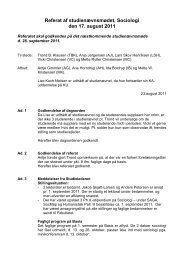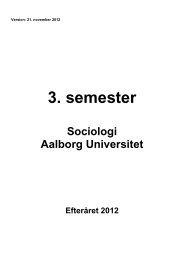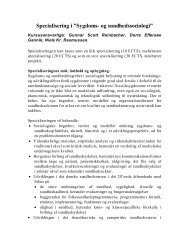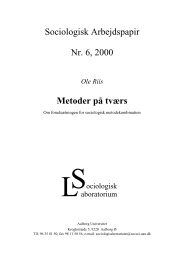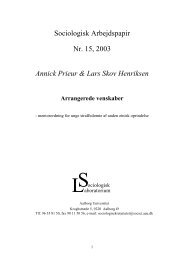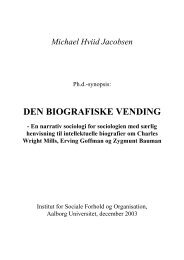Utopianism in the Work of Zygmunt Bauman - Sociologi - Aalborg ...
Utopianism in the Work of Zygmunt Bauman - Sociologi - Aalborg ...
Utopianism in the Work of Zygmunt Bauman - Sociologi - Aalborg ...
Create successful ePaper yourself
Turn your PDF publications into a flip-book with our unique Google optimized e-Paper software.
on his notions <strong>of</strong> what utopia means. Utopia is thus a way <strong>of</strong> th<strong>in</strong>k<strong>in</strong>g alterna-<br />
tively <strong>of</strong> reality, a way <strong>of</strong> look<strong>in</strong>g at <strong>the</strong> ‘familiar <strong>in</strong> unfamiliar ways’ and<br />
<strong>Bauman</strong> already early on rem<strong>in</strong>ded his readers that “our would is one <strong>of</strong> many<br />
possible worlds” (<strong>Bauman</strong> 1967:409). His utopianism is a way <strong>of</strong> comb<strong>in</strong><strong>in</strong>g<br />
thought and action, an act <strong>of</strong> thought that enables its possessor to comprehend<br />
reality <strong>in</strong> a more full and fertile fashion, an act <strong>of</strong> thought that enables people to<br />
act and seek to transcend reality <strong>in</strong>stead <strong>of</strong> paralys<strong>in</strong>g <strong>the</strong>m. Especially people<br />
and scholars not <strong>in</strong>doctr<strong>in</strong>ated <strong>in</strong>to <strong>the</strong> orthodox and rigid rules <strong>of</strong> habitual<br />
thought and common sense such as strangers or outsiders, as <strong>Bauman</strong> himself,<br />
will have an advantage <strong>in</strong> this endeavour as opposed to those expos<strong>in</strong>g <strong>the</strong> traits<br />
<strong>of</strong> tra<strong>in</strong>ed <strong>in</strong>capacity to see alternative routes: “Those unaccustomed to <strong>the</strong> ac-<br />
cepted ways <strong>of</strong> th<strong>in</strong>k<strong>in</strong>g who enter <strong>the</strong>se relations carry<strong>in</strong>g o<strong>the</strong>r forms <strong>of</strong> life<br />
may f<strong>in</strong>d, by default, that <strong>the</strong>y question and so disrupt accepted ways. They may<br />
question <strong>the</strong>mselves <strong>in</strong> <strong>the</strong> process, but <strong>the</strong>ir actions may also have a transfor-<br />
mative effect on <strong>the</strong> form <strong>of</strong> life itself” (<strong>Bauman</strong> & May 2001:179). Strangers,<br />
outsiders, sociologists; all <strong>of</strong> <strong>the</strong>se are people who sit solidly astride <strong>the</strong> barriers<br />
meant to keep th<strong>in</strong>gs apart but from <strong>the</strong>ir elevated or excluded platforms – that<br />
sometimes are substituted with prison cells or concentration camps - <strong>the</strong>y may<br />
be able to glimpse hope <strong>in</strong> <strong>the</strong> midst <strong>of</strong> despair and misery, <strong>the</strong> germ<strong>in</strong>at<strong>in</strong>g<br />
promise even <strong>in</strong> our endemically tragic human condition. This is as much a sti-<br />
fl<strong>in</strong>g and terrify<strong>in</strong>g experience, as it is equally a moral challenge. As Cornelius<br />
Castoriadis, a spiritual soul mate <strong>of</strong> <strong>Bauman</strong>, mused:<br />
We will always […] have to make our lives under <strong>the</strong> tragic conditions that char-<br />
acterize those lives, for we do not always know where good and evil lie, ei<strong>the</strong>r on<br />
<strong>the</strong> <strong>in</strong>dividual level or on <strong>the</strong> collective level. And yet, nei<strong>the</strong>r are we condemned<br />
to evil, any more than we are to good, for we can, most <strong>of</strong> <strong>the</strong> time, turn back<br />
upon ourselves, both <strong>in</strong>dividually and collectively, reflect upon our acts, re-<br />
exam<strong>in</strong>e <strong>the</strong>m, correct <strong>the</strong>m, repair <strong>the</strong>m (Castoriadis 1997a:122).<br />
33



